
For small businesses, startups, and anyone trying to grow on a tight budget, gaining visibility in search engines can feel like an uphill battle against competitors with deep pockets. But what if you could achieve significant organic growth without the typical four figure monthly agency retainer? This is where finding a smart, affordable SEO strategy becomes a game changer. It’s not about cutting corners; it’s about investing in high leverage activities that deliver a real return, allowing you to compete and win in the search results.
What Is “Affordable SEO”? (And How It Differs From “Cheap” SEO)
Let’s clear up a common misconception. Affordable SEO is not the same as “cheap SEO”. Cheap SEO often involves cutting corners with outdated tactics like buying low quality links or using spun content, which can get your site penalized by Google.
Affordable SEO, on the other hand, is about maximizing value. It focuses on efficiency, smart strategy, and sustainable growth (see our guide to low cost SEO services for what to include at different budgets). It prioritizes the foundational pillars of search engine optimization that drive the most impact for the lowest relative cost.
Think of it this way:
- Cheap SEO looks for shortcuts and often leads to long term damage.
- Affordable SEO looks for leverage, using smart systems and modern tools to deliver results without the massive overhead of a traditional agency. Services like Rankai combine AI efficiency with human expertise to make powerful SEO accessible.
The Real Risks of “Cheap” SEO
Opting for a cheap SEO provider to save money can often cost you more in the long run. Understanding the risks is key to making a smart investment.
- Google Penalties: Cutting corners with tactics like buying spammy links or using automatically generated low value content can lead to manual actions or algorithmic penalties from Google, effectively making your site invisible.
- Wasted Investment: A few hundred dollars spent on a service that yields no results or gets your site penalized is a complete loss. True affordable SEO is an investment in assets that grow over time.
- Damaged Reputation: Low quality content and spammy tactics can damage your brand’s credibility with potential customers who do find your site.
- Short Lived Results: Some cheap tactics might provide a temporary, small boost, but they are not sustainable and often lead to a sharp decline in rankings later.
What Does Affordable SEO Cost? Pricing Models and Benchmarks
SEO pricing can seem all over the map, but it generally falls into a few common models.
- Monthly Retainer: This is the most common model, where you pay a fixed fee each month. Prices can range from $500 to over $5,000. Many modern AI assisted services offer comprehensive programs in the more affordable $500 range.
- Project Based: This involves a one time fee for a specific, defined project like a technical SEO audit or a content campaign. Costs can vary widely based on scope.
- Hourly Consulting: You pay an hourly rate for an SEO expert’s time. Rates often fall between $75 and $250 per hour.
While some providers offer highly customized packages, this can sometimes lead to scope creep and unpredictable costs. For small businesses, a predictable, flat fee program that includes a comprehensive set of deliverables (like content, technical fixes, and strategy) often offers greater value and clarity. It removes the guesswork and ensures you are consistently executing on the most important activities.
First, Set Clear and Measurable SEO Goals
Before you can determine a budget or choose a strategy, you need to know what you want to achieve. Vague goals like “more traffic” are not helpful. Instead, focus on SMART goals (Specific, Measurable, Achievable, Relevant, Time bound).
- Business Goals: Start with your primary business objectives. Do you need more leads, direct online sales, or phone calls? For example, a goal could be “Generate 50 qualified leads through organic search within 6 months.”
- Traffic and Ranking Goals: These should support your business goals. A supporting goal might be “Rank on page one for 10 bottom of the funnel keywords” or “Increase organic traffic to our service pages by 30% in the next quarter.”
- Conversion Goals: Track how many visitors from organic search complete a desired action, like filling out a form or making a purchase. This is crucial for calculating ROI.
How to Determine Your SEO Budget
Setting a realistic SEO budget is the first step toward a sustainable strategy. Instead of picking a number out of thin air, consider these approaches to find a budget that aligns with your business goals.
- Percentage of Revenue: A common rule of thumb is to allocate 5% to 15% of your total revenue to marketing. If SEO is a primary growth channel for you, dedicating a significant portion of that marketing budget to it makes sense.
- Goal Oriented Costing: Work backward from your goals. Determine the lifetime value (LTV) of a new customer. Then, decide what you are willing to pay to acquire one (your target customer acquisition cost, or CAC). This helps you evaluate SEO services based on their potential to deliver customers at or below your target CAC.
- Competitor Based Benchmarking: While you may not know exactly what your competitors spend, you can use SEO tools to estimate their organic traffic and the value of that traffic. This gives you a baseline for what it might take to compete in your space. A modest, consistent investment is often better than sporadic, large expenditures.
A good starting point for a small business is often in the $500 to $2,000 per month range. This allows for consistent effort in core areas like content and technical SEO, which builds momentum over time.
How to Benchmark Your SEO Performance
Benchmarking gives you a baseline to measure progress against. Without it, you are flying blind.
- Internal Benchmarking: Look at your own historical data in Google Search Console and Google Analytics. What has your organic traffic been for the last 12 months? What are your current rankings for your most important keywords? This is your starting line.
- Competitor Benchmarking: Identify your top 3 to 5 direct competitors in search results. Use SEO tools (even the free versions) to analyze their estimated organic traffic, top ranking keywords, and backlink profiles. This helps you understand the competitive landscape and set realistic goals. The aim isn’t just to copy them, but to find gaps and opportunities they have missed.
Core Components of an Affordable SEO Program
A worthwhile affordable SEO service should never skimp on the essentials. Here are the core components you should expect, even on a budget.
1. ROI Focused Keyword Research on a Budget
Your strategy should be built on keywords that your customers are actually searching for. This means going beyond obvious high volume terms and finding opportunities with clear purchase intent or that address specific user pain points.
To do this on a budget, leverage free and powerful tools:
- Google Search Console: Your own GSC performance report is a goldmine. Look for queries where you already rank on page two or three. Improving these pages can deliver quick wins.
- Google Keyword Planner: While designed for ads, it provides excellent keyword volume estimates and ideas.
- Free Keyword Tools: Use the free tiers of tools like Ahrefs, Semrush, or Ubersuggest to find low competition, long tail keywords that larger competitors often ignore. These specific, multi word phrases usually have higher conversion intent.
2. High Velocity Content Creation
Content is the engine of SEO. To compete, you need to publish consistently. A strong affordable SEO plan should produce a significant volume of high quality, optimized content each month, organized by a keyword cluster so you cover a topic comprehensively. Some services can publish 20 or more pages monthly, dramatically accelerating your ability to rank for a wide range of topics.
3. Foundational Technical SEO Fixes
Your content can’t rank if Google can’t crawl, understand, and index your site. An essential part of any SEO program is addressing technical issues like slow page speed, broken links, improper metadata, and mobile usability problems. Start with a thorough technical SEO audit to find them.
4. Smart Link Building on a Budget
Backlinks (links from other websites to yours) remain a crucial ranking factor. While large scale link building campaigns can be expensive, several budget friendly strategies can build your site’s authority.
- Guest Posting: Write articles for reputable blogs in your niche. In exchange for your valuable content, you typically get an author bio with a link back to your site.
- Resource Link Building: Create a genuinely useful resource, like an in depth guide, a free tool, or a unique data study. Then, reach out to sites that link to similar (but perhaps outdated) resources and suggest they add a link to yours.
- Digital PR: Use services like Help a Reporter Out (HARO) to provide expert quotes to journalists. When they use your quote, they often link back to your website as the source.
- Unlinked Brand Mentions: Set up alerts to find where your brand is mentioned online without a link. Reach out and politely ask for the mention to be linked to your homepage.
5. Mastering Local Presence with Google Business Profile
For local businesses, a well optimized Google Business Profile (GBP) is the most powerful and affordable SEO tool available. It’s your ticket to showing up in the valuable Google Maps “local pack”.
Start by ensuring your profile is 100% complete and accurate. This includes your business name, address, phone number, hours, and service categories. Then, elevate your profile with these tactics:
- High Quality Photos: Regularly upload photos of your business, products, team, and happy customers.
- Google Posts: Use this feature to share updates, offers, and events directly in your profile.
- Q&A Section: Proactively populate this section by asking and answering common questions your customers have.
A crucial part of your GBP strategy is review management. Actively encourage satisfied customers to leave reviews. Positive reviews build trust and are a known local ranking factor. Equally important is responding to all reviews, both positive and negative. A thoughtful response to a negative review can often win over prospective customers by showing you are attentive and care about customer satisfaction.
6. Continuous Optimization and Rewrites
SEO isn’t a “set it and forget it” activity. A modern approach involves monitoring performance and iteratively improving pages that aren’t ranking. A unique benefit offered by some new services is the “rewrite until it ranks” model, where underperforming content is automatically rebuilt at no extra cost. This commitment to results is a hallmark of a truly performance focused partner.
Timeline, ROI, and When Budget SEO Works (and When It Doesn’t)
One of the most common questions is, “How long will it take to see results?”. While every situation is different, most SEO professionals agree that it typically takes 3 to 6 months to start seeing meaningful traction.
When affordable SEO works best:
- For small and medium businesses competing in local or niche markets.
- For startups and SaaS companies needing scalable, repeatable organic growth.
- For ecommerce stores looking to build topical authority and attract bottom of funnel traffic.
When a larger budget might be needed:
- When targeting highly competitive, broad keywords on a national or global scale.
- When your business model relies heavily on building brand authority through extensive digital PR and link building campaigns.
Even in competitive spaces, a high volume content strategy can build a strong foundation of visibility that you can build on over time.
How to Choose an Affordable SEO Company or Freelancer
Vetting an SEO provider is crucial. Here are key things to look for.
- Transparency: They should be clear about what they do each month and how they do it. Avoid anyone who talks about “secret sauce” or proprietary methods.
- Clear Deliverables: You should know exactly what you’re getting for your money. How many articles? What technical fixes are included? How is reporting handled?
- Focus on Business Metrics: Reporting should focus on what matters, rankings, traffic, and conversions, not just vanity metrics. Look for providers that offer simple, clear reporting, like the “No BS” reports provided by Rankai.
- Flexibility: For a small business, being locked into a 12 month contract can be risky. Look for providers that offer monthly agreements or a “cancel anytime” policy.
- Proof of Results: Ask for case studies or examples of their work. Even anonymized screenshots from Google Search Console can demonstrate their ability to deliver growth.
Buyer’s Guide: Evaluating SEO Tools on a Budget
If you plan to handle some SEO tasks in house, the right tools can make all the difference. Our list of top SEO automation tools can help you save time without overspending. When evaluating tools on a budget, consider the following:
- Freemium Models: Many powerful tools offer a free tier that is perfect for small businesses. These might have limits on searches or projects, but they provide access to essential data.
- Focus on Core Functionality: Do you need a massive all in one suite, or can a specialized tool for keyword research or rank tracking do the job? Focus on your most immediate needs.
- Look for Bundles: Some platforms bundle multiple tools together, offering better value than subscribing to several individual services.
Top 15 Affordable SEO Tools and Services
Navigating the expansive market of search engine optimization can be challenging, which is why we’ve curated a list of the top 15 affordable SEO tools and services. These selections are distinguished by their excellent value, robust feature sets, and positive user feedback, making them suitable for businesses aiming to boost their online visibility without overspending. Reviewing these options will help you identify a solution that aligns with your specific marketing objectives and budgetary constraints.
1. Rankai (YC backed AI SEO/Marketing Agency)
Rankai blends human strategists with an AI content engine to turn SEO into a flat fee, done for you growth channel. It tackles the heavy lifting (keyword strategy, content at scale, and site fixes) so SMBs, startups, and ecommerce teams can grow predictably without long contracts or surprise scope creep.
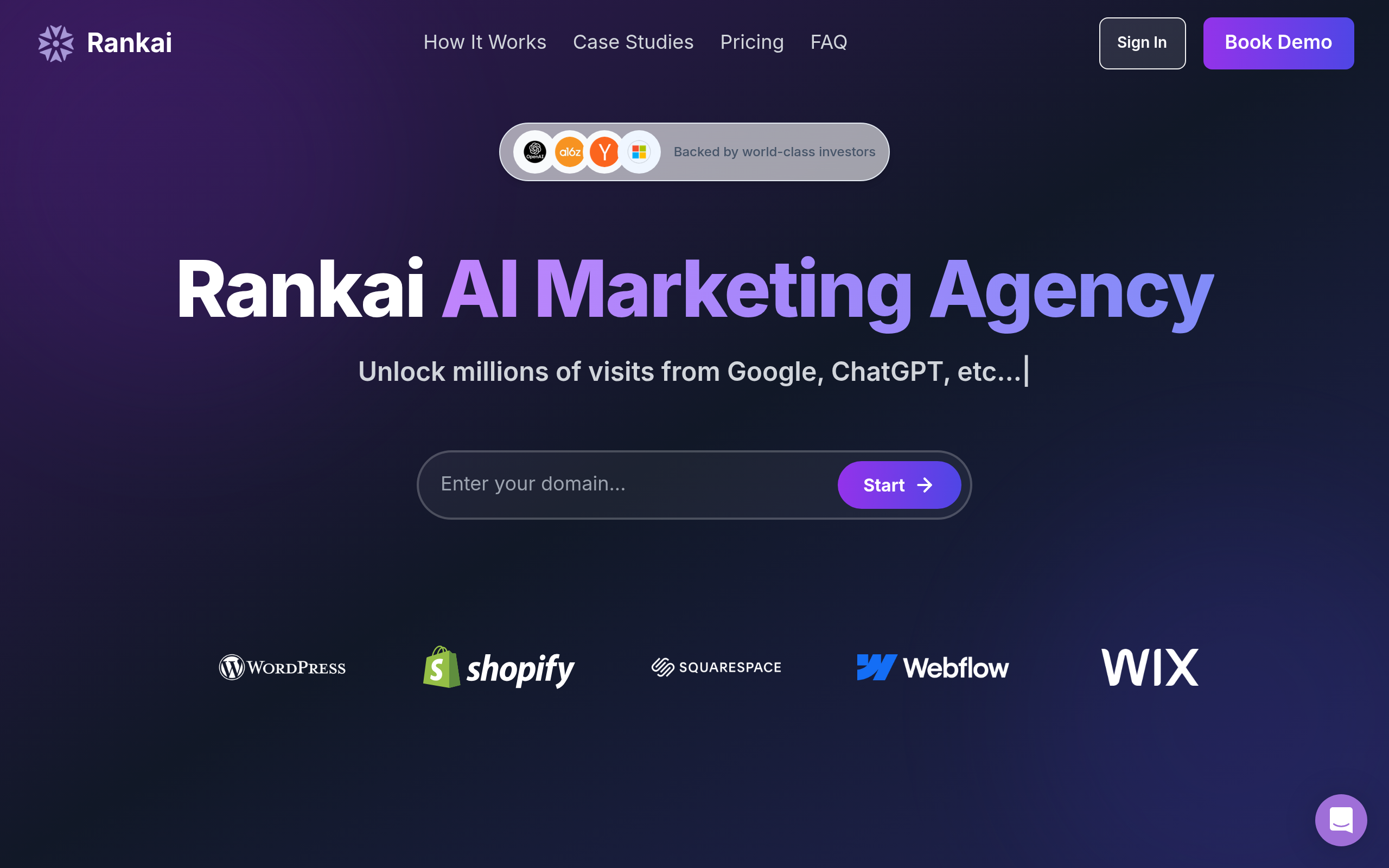
What you’ll get
- High volume content production: 20 SEO ready pages per month with metadata, internal links, and visuals.
- Expert keyword and topic strategy aligned to ROI, including competitive gap analysis to uncover winnable terms.
- Performance based rewrites for underperforming pages, ensuring continuous improvement and compounding results.
- Integrated on page technical fixes, direct publishing, and weekly, plain language reporting.
Where it shines (and trade offs)
- Pros:
- Predictable, flat pricing for high content velocity.
- Fast iteration loop powered by AI plus human QA.
- Cons:
- Off page link building not included.
- Single standardized plan may not suit custom enterprise needs.
Price at a glance: From $499/month, cancel anytime (20 pages plus technical fixes included).
2. The Hoth
The Hoth packages SEO into straightforward building blocks (links, content, and managed campaigns) so you can scale exactly what you need. With low entry points and a la carte ordering, SMBs and startups can test tactics, dial in what works, and expand without committing to a major retainer.
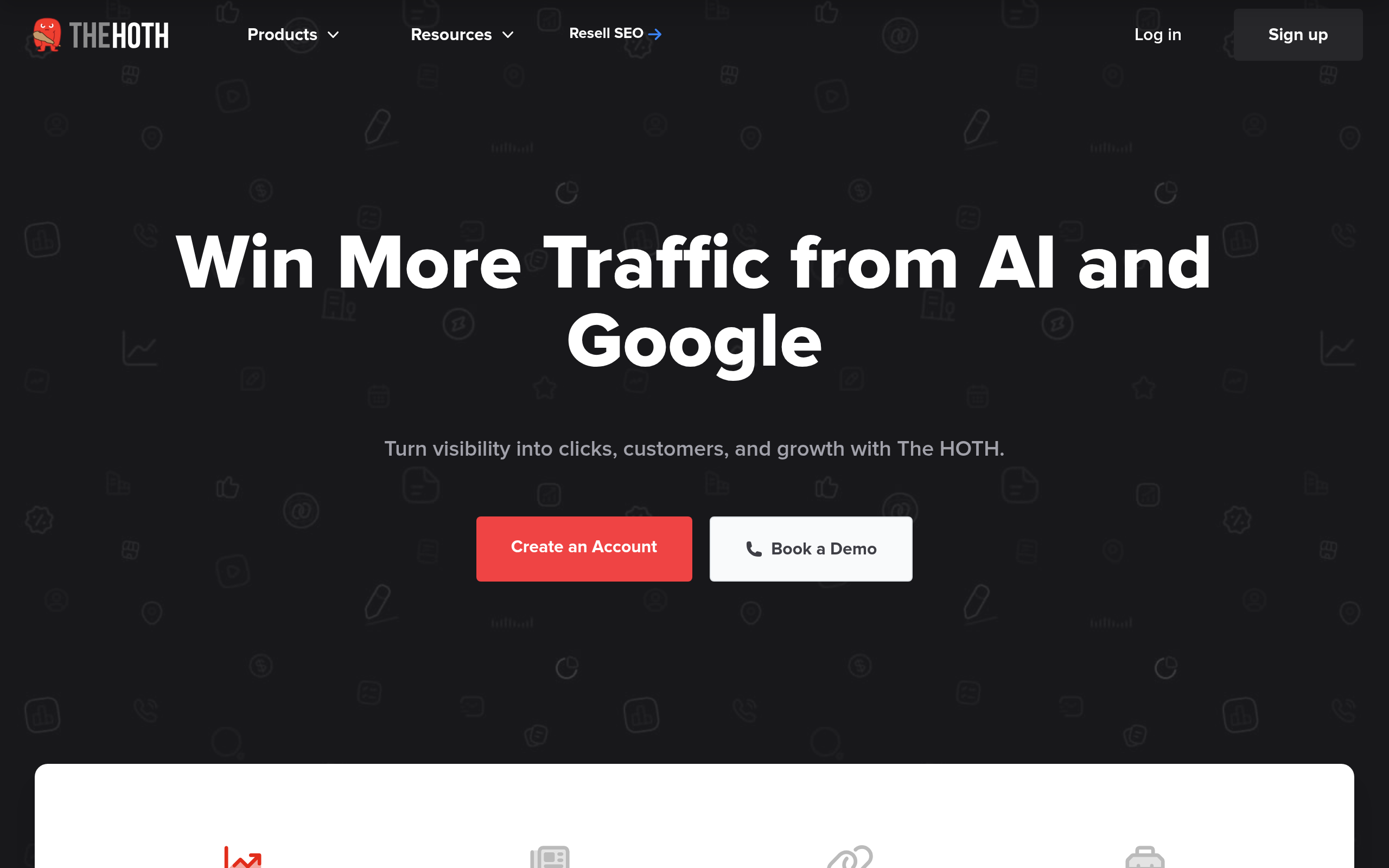
What you’ll get
- Managed SEO (HOTH X) with a dedicated manager who combines links, content, and technical work to your budget.
- A la carte guest post outreach with site filters by DA/DR and traffic for quality control.
- Local SEO and citation services to strengthen Map Pack visibility and NAP consistency.
- Content creation for blogs and site copy built for E E A T.
Where it shines (and trade offs)
- Pros:
- Productized menu with transparent pricing and low risk trials.
- One vendor for links, content, and fully managed SEO.
- Cons:
- Managed packages require a higher monthly commitment.
- Premium links cost more at higher authority tiers.
Price at a glance: From $150 per link or $500/month for starter plans; managed services from $1,000/month.
3. SEO Reseller
SEOReseller powers agencies with white label SEO they can rebrand and resell to SMB clients. Predictable packages, a client ready dashboard, and a U.S. based fulfillment team make scaling simple, with no in house hires required and no long term contracts.

What you’ll get
- Packaged Local and National SEO tiers covering content optimization, link building, technical fixes, and reporting.
- Campaign types tailored to common scenarios, including Local SEO or Google Business Profile only management.
- A fully white labeled dashboard to show progress and reports under your brand.
- U.S. based fulfillment with reliable QA and communication.
Where it shines (and trade offs)
- Pros:
- Affordable wholesale pricing with month to month flexibility.
- White labeled everything, plus a 30 day money back guarantee.
- Cons:
- Rigid packages can constrain highly bespoke campaigns.
- Built for agencies, not direct to SMB use.
Price at a glance: Starts at $499/month per client for Local SEO; no long term contracts.
4. Third Marble Marketing
Third Marble Marketing delivers predictable, month to month SEO for small businesses, with no long contracts and no guesswork. Each package specifies how many pages get optimized and what’s included, helping owners match scope to budget and see steady, compounding gains.

What you’ll get
- Local SEO packages optimizing 10, 20, or 40 pages per quarter, plus GBP management and citations.
- National and ecommerce SEO with one time setup, followed by monthly per page on page improvements.
- Ongoing technical health checks for broken links, mobile usability, and spam backlink reviews.
- Low cost add ons like GBP posts, review responses, and backlink packages.
Where it shines (and trade offs)
- Pros:
- Transparent, published pricing with month to month flexibility.
- Strong local SEO fundamentals and scalable national scope.
- Cons:
- Local tiers cap optimization volume by pages per quarter.
- Significant backlink volume typically requires add ons.
Price at a glance: Local SEO from $399/month; National plans include a $499 first month setup.
5. Mainstreethost
Mainstreethost has helped SMBs win organic traffic since 1999 with clear, entry level SEO packages and optional add ons. If you want professional execution without enterprise pricing, its transparent tiers and long standing SMB focus make it a dependable, budget conscious pick.
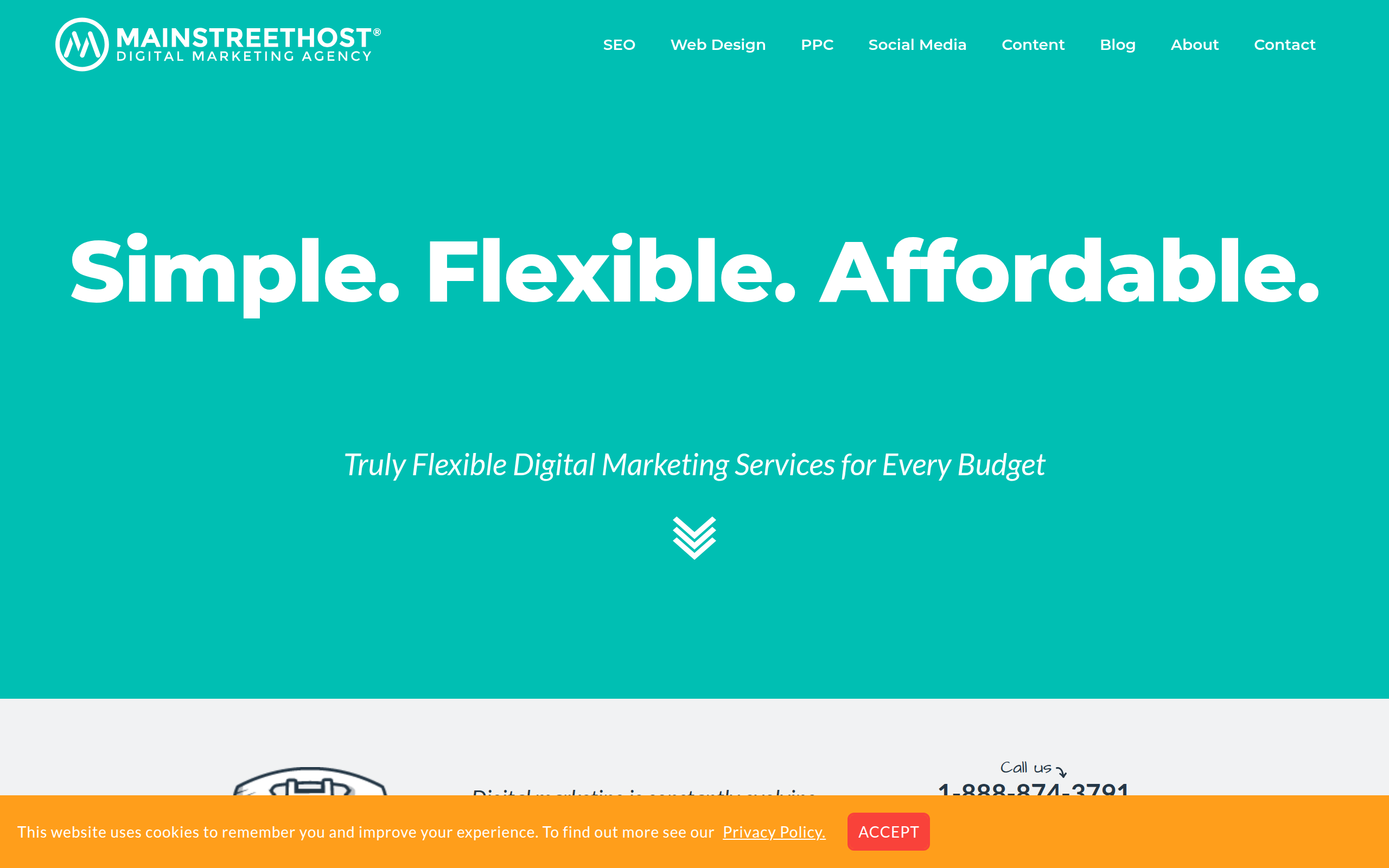
What you’ll get
- Core SEO workflow: site audit, competitive analysis, keyword research, on page implementation, and ongoing reporting.
- Local SEO: GBP optimization, citation management, and localized content to lift Map Pack rankings.
- Technical site health: speed improvements, schema markup, and penalty recovery support.
- AI search visibility add on (GEO) to appear in AI powered answer engines.
Where it shines (and trade offs)
- Pros:
- Affordable, transparent tiers and long SMB track record.
- Flexible add ons, including AI search visibility.
- Cons:
- Lowest pricing often tied to annual billing.
- Full deliverables clarified during consultation.
Price at a glance: From $99/month (Essentials, billed annually); additional packages and GEO add ons available.
6. Softtrix
Softtrix offers packaged SEO built for small businesses and ecommerce brands that need clarity on cost and deliverables. With low cost tiers covering on page, content, and links, it’s a straightforward way to grow rankings while managing cash flow.
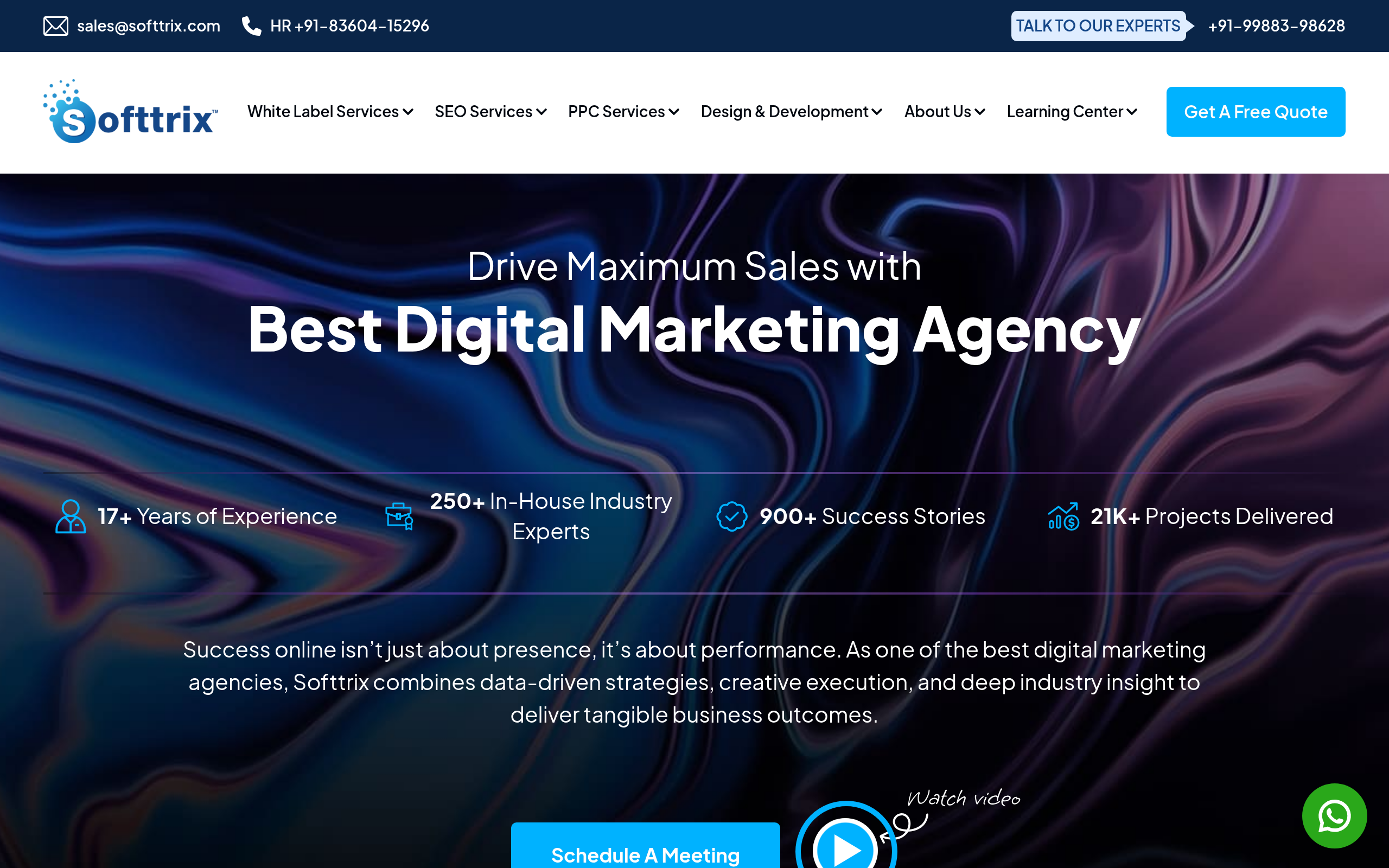
What you’ll get
- Technical and on page SEO, including keyword research, speed improvements, and metadata fixes.
- Consistent content: 2 to 5 blog posts and guest posts per month to build authority.
- Local SEO with GBP optimization and citation building.
- Monthly reporting on rankings, traffic, and acquired links.
Where it shines (and trade offs)
- Pros:
- Transparent, low cost entry plans with clear deliverables.
- Easy budgeting for content and link output.
- Cons:
- Base plans may be light for competitive niches.
- Higher authority link targets increase costs.
Price at a glance: From $199/month (Small Business); typical retainers $300 to $1,500/month.
7. FATJOE
FATJOE turns SEO tasks into on demand purchases: buy a link, a batch of citations, or a set of articles, and scale as needed. The pay as you go model with a money back guarantee is ideal for startups and local teams that want to control spend while testing what moves the needle.
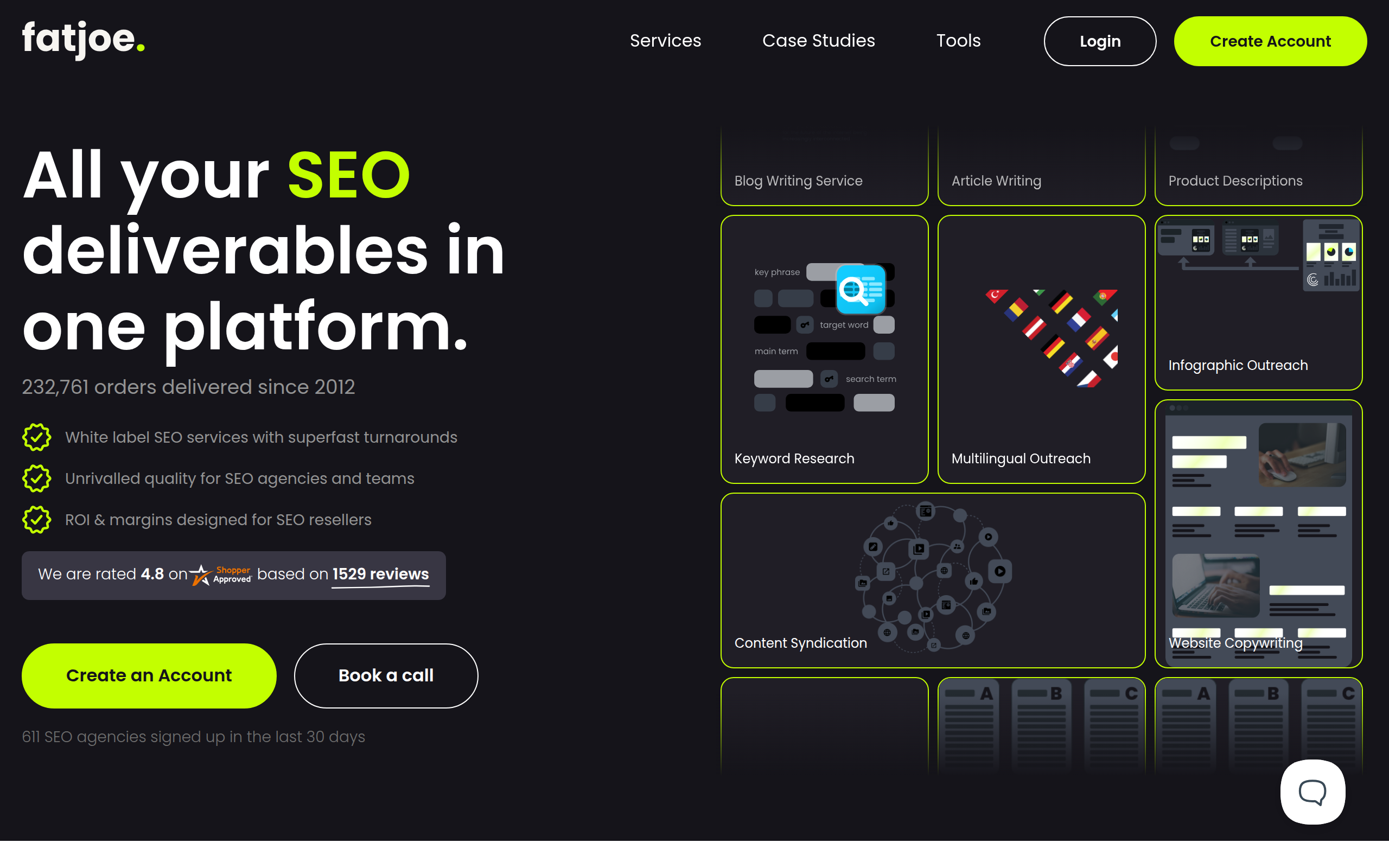
What you’ll get
- Blogger Outreach and niche edits with do follow links on sites filtered by DR and traffic.
- Local citation building across key directories in the US, UK, AUS, and CAN.
- On demand content writing by UK/US writers with optional SEO optimization.
- Managed link building “Grow” bundles with concierge support and a single report.
Where it shines (and trade offs)
- Pros:
- Transparent, task based pricing that’s easy to scale up or down.
- Simple dashboard for ordering and tracking multiple services.
- Cons:
- Limited control over exact placement sites.
Price at a glance: From $72 per link (Blogger Outreach); Local Citations from $90; Content Plans from $240.
8. MarketKeep
MarketKeep focuses on small business SEO retainers with clear deliverables and friendly pricing. After a short ramp up, it shifts to month to month, making it a practical choice for owners who want steady local growth without being locked into long agreements.
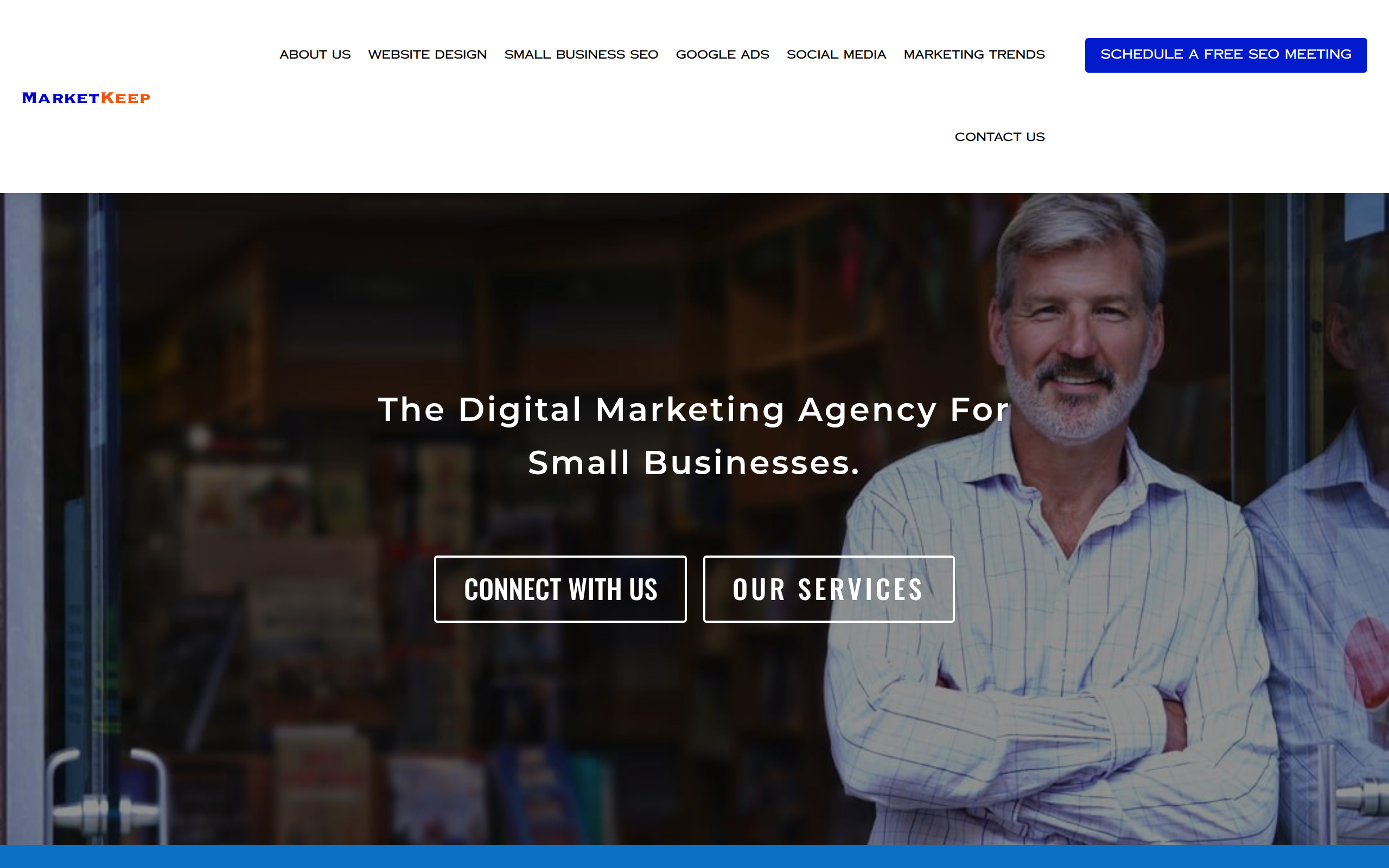
What you’ll get
- Local SEO and GBP optimization to win Map Pack and “near me” searches.
- On page fundamentals: keyword research, titles, meta descriptions, and content tuning.
- 2 to 4 blog posts per month to expand topical coverage.
- Off page SEO including backlinks and citations, plus weekly reporting and check ins.
Where it shines (and trade offs)
- Pros:
- Very low starting price with transparent inclusions.
- Month to month flexibility after initial onboarding.
- Cons:
- Standardized packages may under serve complex technical needs.
- Rapidly scaling companies may outgrow preset tiers.
Price at a glance: Packages range from $225 to $550/month; month to month after the first three months.
9. On The Map Marketing
On The Map Marketing is built for local and SMB teams that want higher rankings and more leads without guessing the plan. With a transparent 90 day sprint model and clear starter pricing, it offers a structured path to measurable progress.
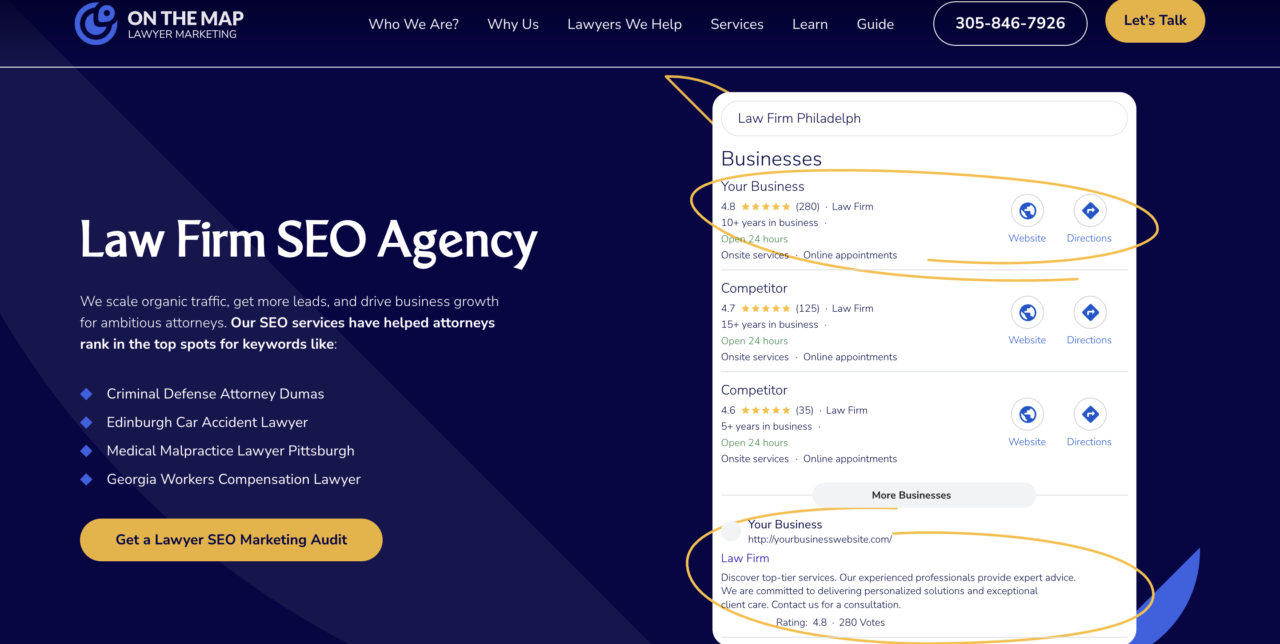
What you’ll get
- Local SEO focus: fully optimized GBP and location pages for stronger Maps and local SERP presence.
- On page and technical implementation aligned to current ranking signals.
- Authority building via targeted outreach for relevant local/industry placements.
- Consistent content creation by in house writers across many verticals.
Where it shines (and trade offs)
- Pros:
- Published pricing removes guesswork for SMB budgets.
- Full service model improves channel coordination.
- Cons:
- Entry level retainer is higher than DIY or freelancer options.
Price at a glance: SEO services from approximately $1,500/month; proposals are customized to scope.
10. Thryv
Thryv is an SMB operating system with a Marketing Center that handles local SEO basics like listings and reviews, plus an optional SEO Management add on for hands off optimization. Start lean with essential tools, then layer in done for you SEO when you’re ready to scale.
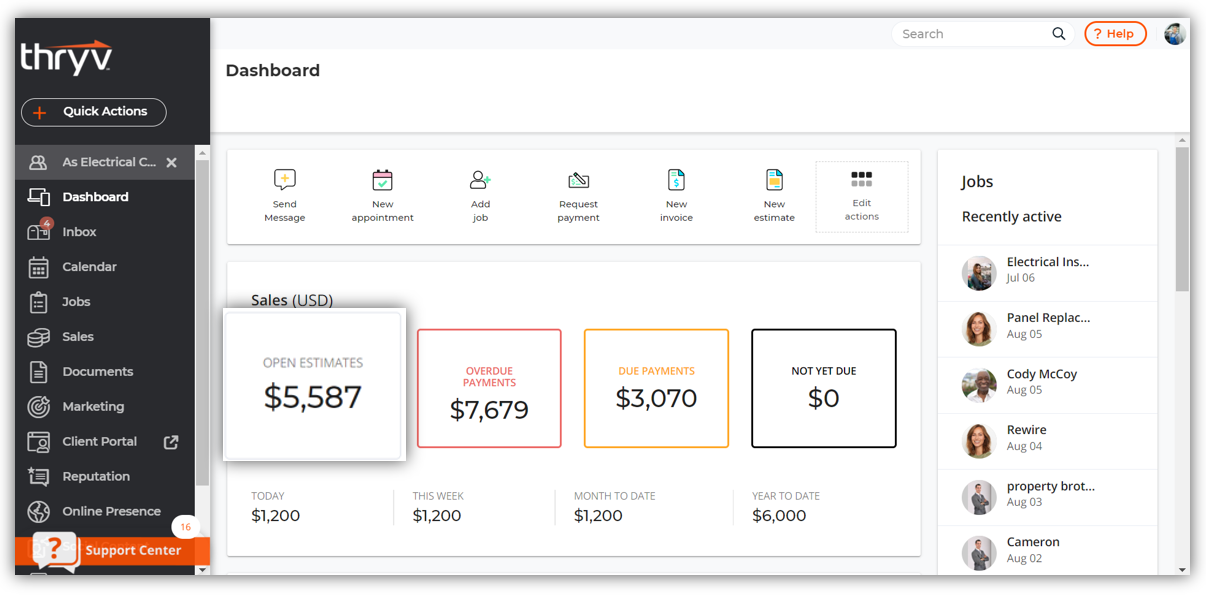
What you’ll get
- Local SEO setup: GBP optimization (categories, services) to lift Map Pack visibility.
- Website SEO improvements: structure, speed, and mobile fixes handled by Thryv’s team.
- Authority building: backlinks, citations, and social bookmarking included in off site SEO.
- Centralized listings management across 64 key directories for NAP consistency.
Where it shines (and trade offs)
- Pros:
- Affordable, scalable way to get local SEO momentum.
- Done for you execution suits busy owners.
- Cons:
- SEO management is not self serve and may involve term commitments.
Price at a glance: Starts at $244/month plus a one time onboarding fee; SEO is a separate add on.
11. PureSEO
PureSEO is a full service search agency, and a 2025 Google Premier Partner, offering SMB friendly packages that grow with you. Start with a free SEO check, then scale from essentials to integrated SEO plus Ads for both quick wins and durable organic growth.
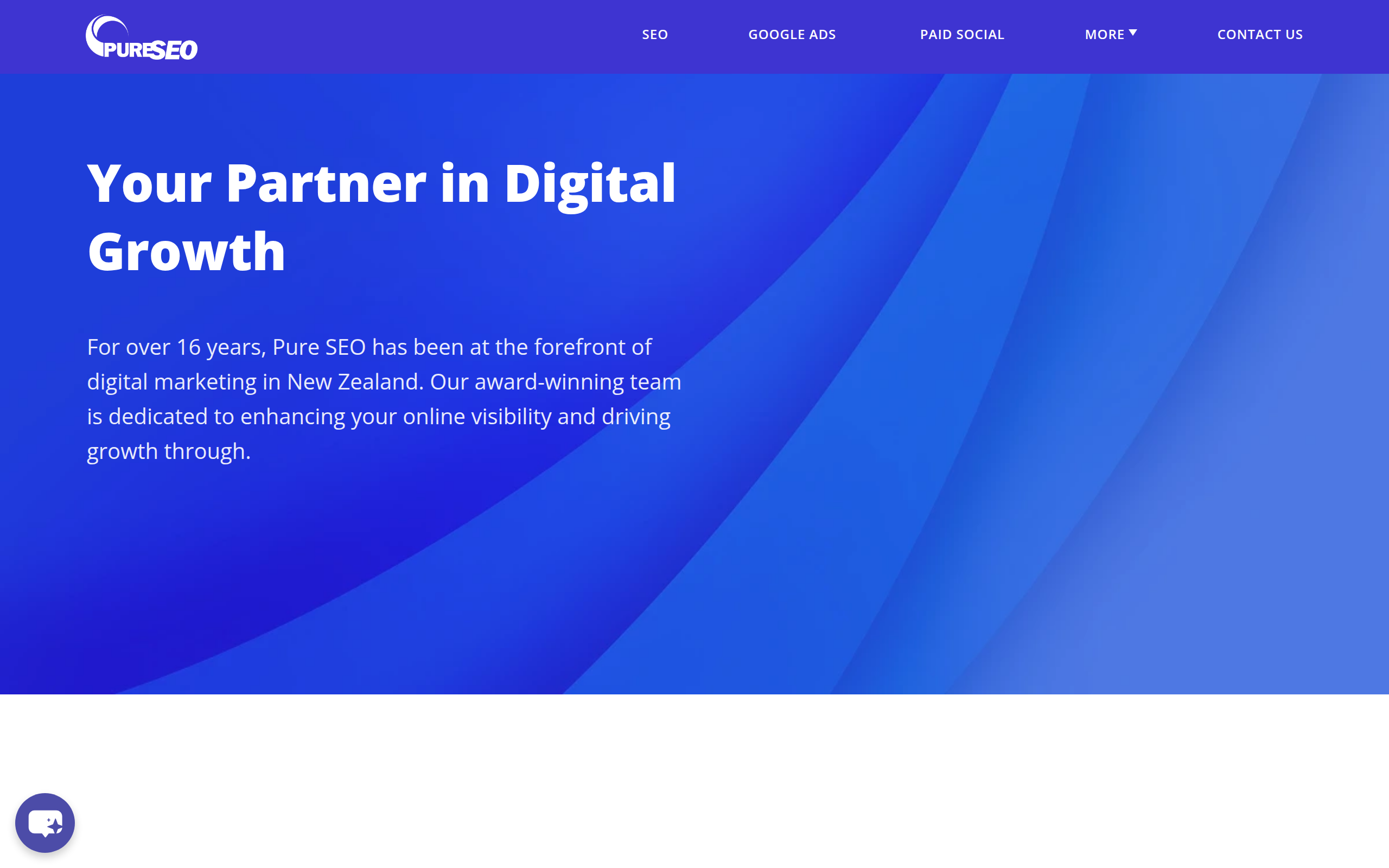
What you’ll get
- Full SEO program: discovery, keyword research, competitor analysis, audit, and a clear growth roadmap.
- On page and technical enhancements to improve speed, crawlability, and landing page relevance.
- Authority and content building via link acquisition and optional copywriting.
- Integrated Google Ads management to bridge results while SEO compounds.
Where it shines (and trade offs)
- Pros:
- One partner across SEO, SEM, and content for full funnel impact.
- Recognized by Google as a Premier Partner.
- Cons:
- Typically requires longer term engagements (often 12 months).
- Pricing is custom quoted rather than public.
Price at a glance: Custom monthly retainer; includes a free initial SEO check.
12. The SEO Works
The SEO Works delivers packaged, full service SEO for SMBs and ecommerce brands, starting with a free audit so you know the strategy before you sign. It’s a practical way to access technical expertise, content, and ethical link acquisition without enterprise overhead.
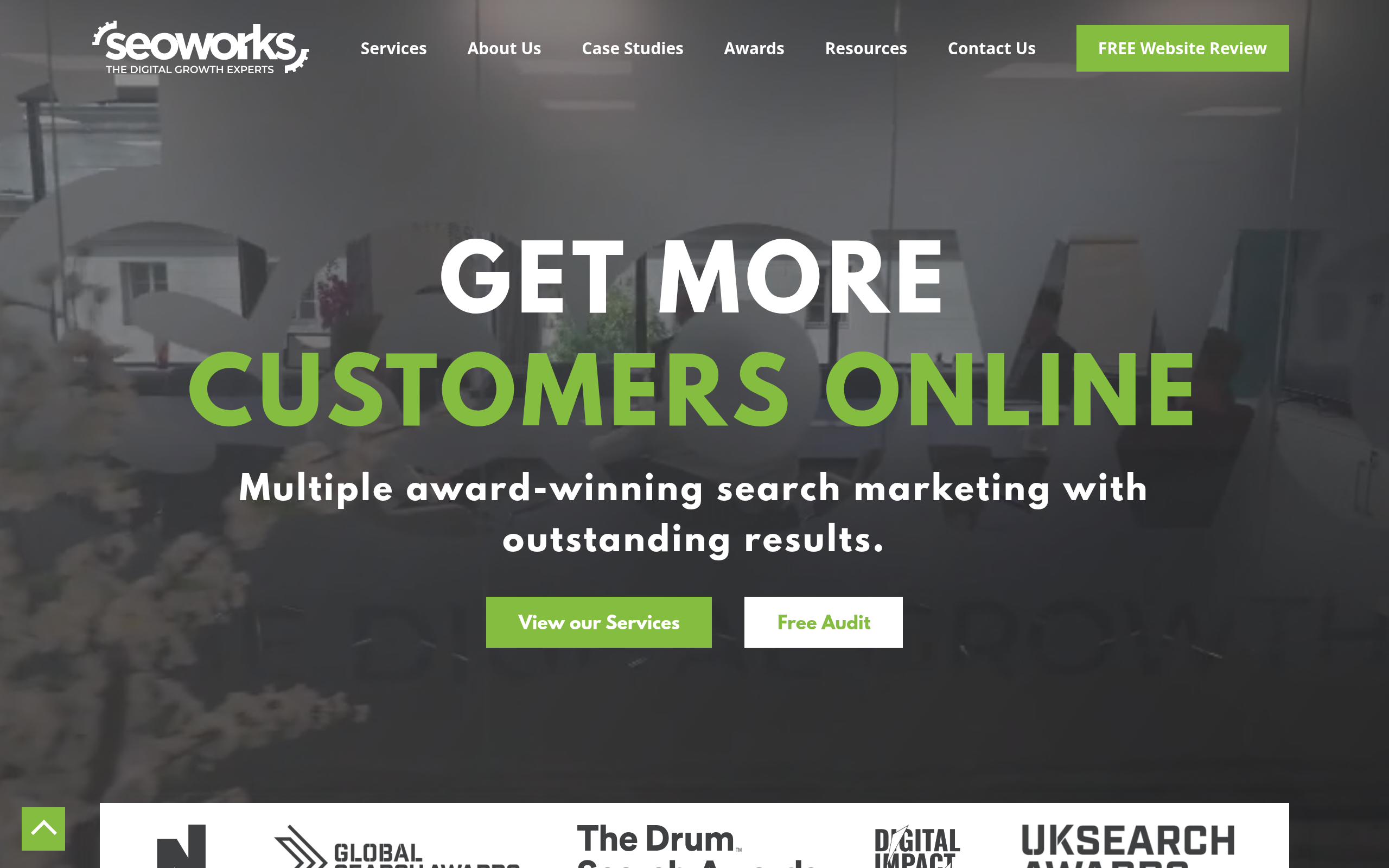
What you’ll get
- A free comprehensive audit and bespoke roadmap detailing the work required.
- Full on page and technical execution with clear monthly reporting.
- Ethical link acquisition and targeted Local SEO programs.
- Ecommerce SEO built to lift category and product rankings.
Where it shines (and trade offs)
- Pros:
- Transparent pricing and true full service capabilities.
- Strong track record with local and ecommerce campaigns.
- Cons:
- UK based operations may pose time zone/currency considerations for U.S. teams.
Price at a glance: Small business plans from £1,500/month; free initial audit included.
13. Delante
Delante specializes in technical and ecommerce SEO with clear, budget friendly entry points. One time packages and sprint like boosts let startups and small teams get expert help fast, prove ROI, and then scale into monthly retainers when it makes sense.
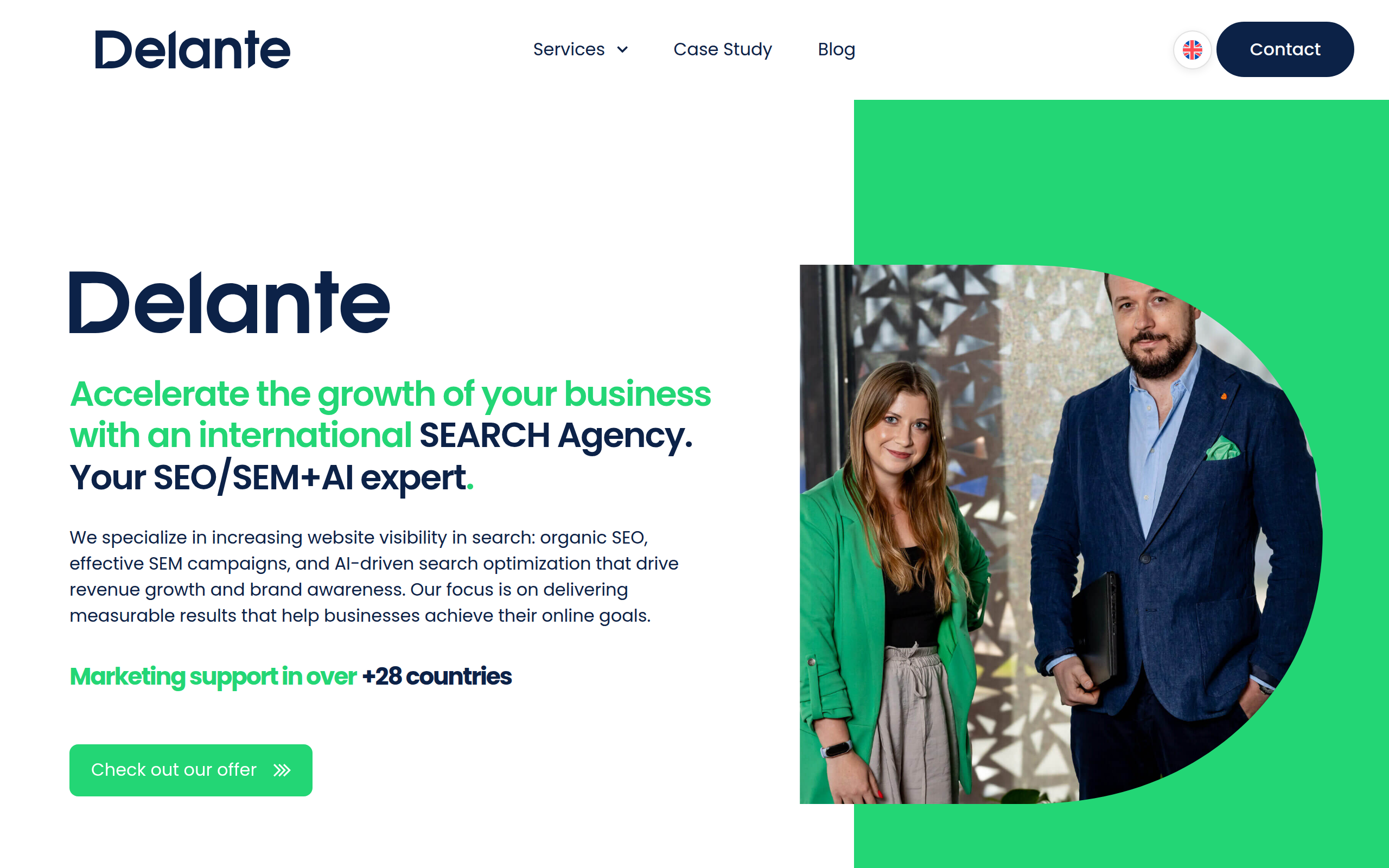
What you’ll get
- One time SEO setup: audit, keyword research, homepage optimization, and analytics/Search Console setup.
- Fixed price “SEO Boosts” combining specialist hours, backlinks, and content for quick impact.
- Ongoing retainers that flex across technical, on page, content, and links.
- Hourly consulting for targeted expert help without a contract.
Where it shines (and trade offs)
- Pros:
- Transparent starter packages lower the barrier to entry.
- Strong client ratings for communication and delivery.
- Cons:
- Service led model requires ongoing investment for sustained growth.
- Some pricing is listed in euros.
Price at a glance: One time packages from $500; ongoing retainers typically $1,000 to $2,000/month.
14. SmartSites
SmartSites combines SEO, PPC, and web design under one roof, assigning a dedicated PM to orchestrate the moving parts. For SMBs that want expert execution without juggling multiple vendors, it’s a polished, full service option, but be ready for a higher starting point than DIY.
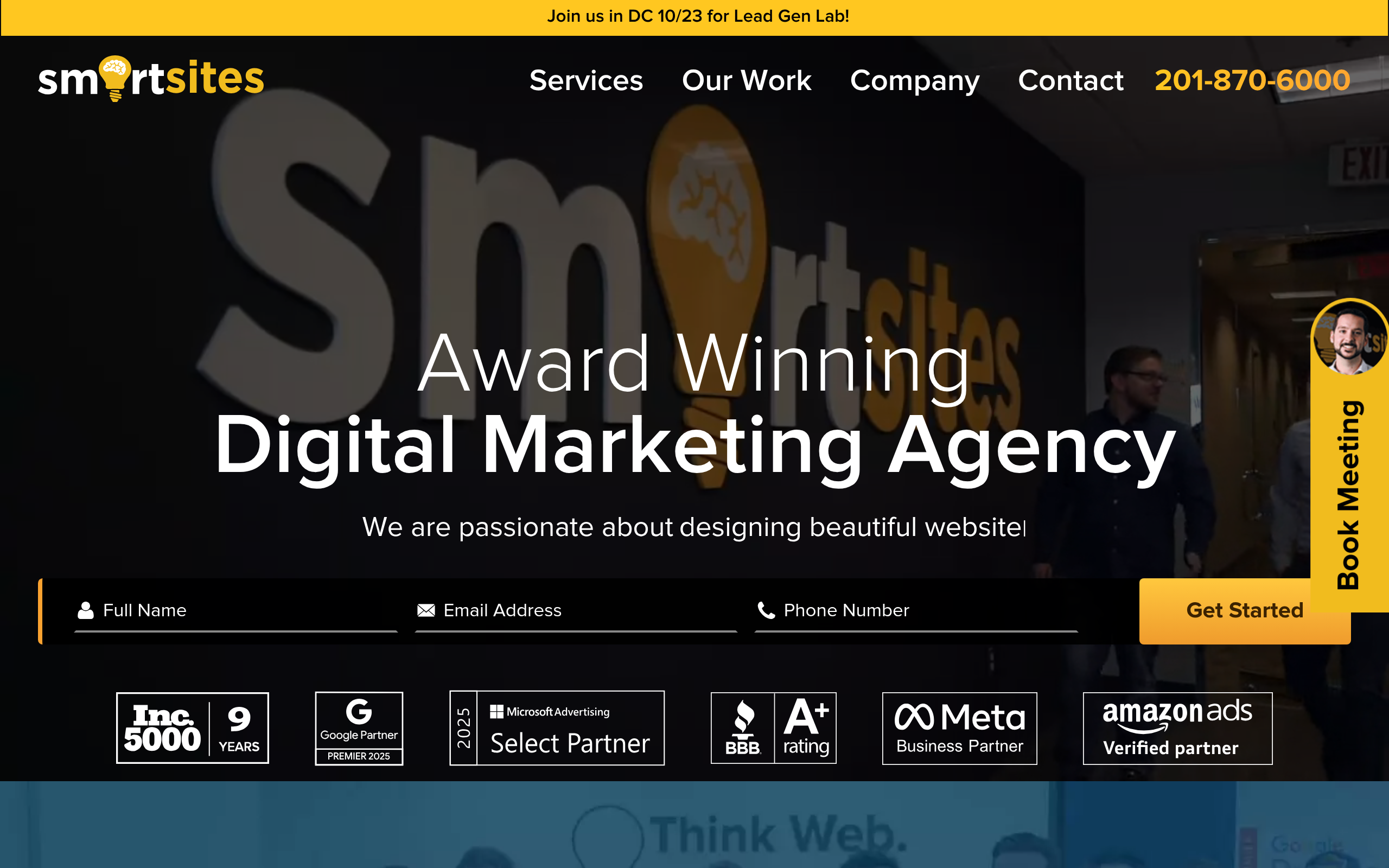
What you’ll get
- Targeted SEO strategy with keyword discovery and a plan mapped to business goals.
- Technical/on page fixes to improve speed, indexing, and site structure.
- Ongoing content creation to build topical authority around priority terms.
- Authority building link campaigns and Local SEO management (GBP plus citations).
Where it shines (and trade offs)
- Pros:
- Strong reputation, reviews, and industry recognition.
- Integrated SEO, PPC, and design for cohesive execution.
- Cons:
- Higher entry price than tools or single freelancers.
- Clarify content volumes and scope upfront.
Price at a glance: SEO packages start at $2,600/month (typical project minimum $1,000 plus).
15. Thrive Internet Marketing Agency
Thrive brings startups, local businesses, and ecommerce shops a clear, month to month path to organic growth. With defined deliverables and flexible terms, it’s a pragmatic way to get technical fixes, content, and authority building underway without a hefty upfront commitment.
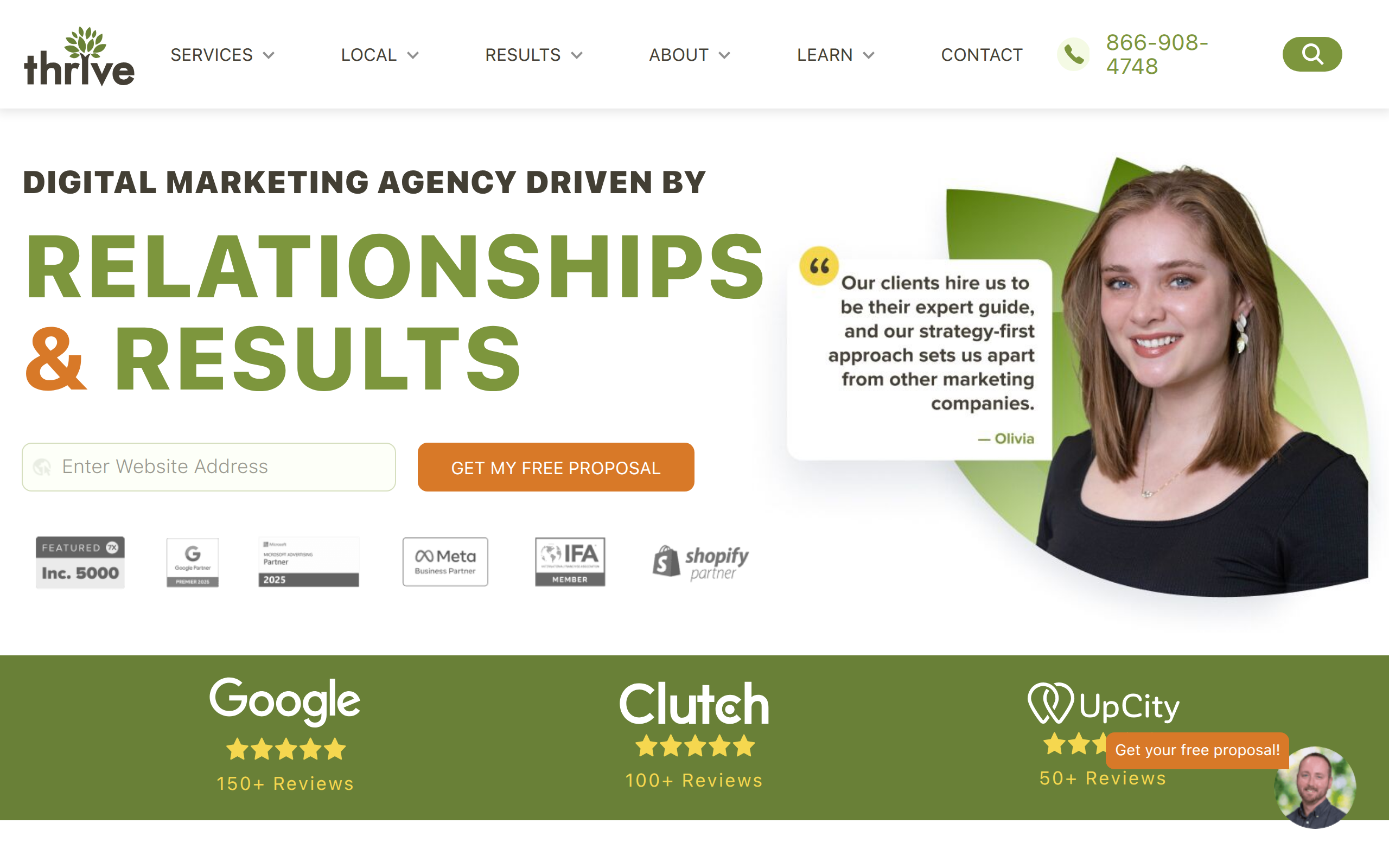
What you’ll get
- Dedicated SEO management with technical audit, competitor analysis, and monthly reporting.
- Local visibility boosts via GBP optimization and optional review/lead tools.
- Defined content and link acquisition volumes for steady growth.
- Page level technical fixes for speed, broken links, and other issues.
Where it shines (and trade offs)
- Pros:
- Month to month flexibility avoids lock ins.
- Transparent packages with clear deliverables.
- Cons:
- Starting price sits above micro budget or DIY tiers.
Price at a glance: From $1,500/month on month to month terms; free proposal available.
90 Day Implementation Plan for Small Budgets
Ready to get started? Here is a simple 90 day plan to kickstart your affordable SEO efforts.
Month 1: Foundation and Planning (Days 1 to 30)
- Week 1: Perform a basic technical SEO audit. Use Google’s free tools like Search Console and PageSpeed Insights to identify major issues.
- Week 2: Conduct initial keyword research. Identify 20 to 30 “low hanging fruit” keywords that have decent search volume and are highly relevant to your business.
- Weeks 3 and 4: Develop a content calendar based on your keyword research (use content mapping to organize topics by intent). Write and publish your first 4 to 5 blog posts, ensuring they are optimized for your target keywords.
Month 2: Content Acceleration (Days 31 to 60)
- Weeks 5 to 8: Ramp up content production. Aim to publish 2 to 3 new articles per week. Focus on creating helpful, in depth content that answers user questions. Make sure to internally link between your new and old posts. This guide on how many internal links per page will help you avoid over or under linking.
Month 3: Monitoring and Initial Optimization (Days 61 to 90)
- Weeks 9 to 12: Monitor your rankings in Google Search Console. Identify pages that are starting to get impressions but aren’t yet on page one. Revisit and improve these pages by adding more detail, updating information, or improving the title and meta description.
This hands on approach can be effective, but it requires significant time. For founders and marketing teams who need to move faster, a done for you service can execute this entire process at scale.
Case Snapshots: Small Businesses Succeeding with Affordable SEO
The proof is in the results. High velocity, affordable SEO programs can drive incredible growth. Consider these real (but anonymized) examples:
- A Creative Marketing Agency saw a 400% traffic increase within months by consistently publishing expert content.
- A SaaS Platform grew from nothing to six figure monthly visitors and millions of impressions in under a year.
- A Local Service Business went from zero online visibility to over 70,000 monthly visitors.
These results were achieved not through massive budgets, but through a consistent, intelligent application of SEO fundamentals, proving that an affordable SEO strategy can be incredibly powerful.
Conclusion: Key Takeaways for Smart, Budget Aligned SEO
Investing in SEO doesn’t have to break the bank. By focusing on value over raw cost, you can find an affordable SEO solution that drives real business growth. The key is to prioritize a smart strategy, consistent content creation, and foundational technical health. Whether you use a suite of affordable tools or partner with a modern, efficient service, the opportunity to grow through organic search is more accessible than ever.
Ready to see how an AI powered, human guided SEO service can accelerate your growth at a price that makes sense? Book a demo with Rankai to learn more.
FAQs: Affordable SEO
What is a realistic budget for small business SEO?
A realistic budget for a comprehensive, affordable SEO service often starts around $500 per month. This price point has become more accessible with the rise of AI assisted agencies that can deliver services, like high volume content and technical fixes, that were previously much more expensive.
Can I do SEO for free?
Yes, you can absolutely start doing SEO for free using tools like Google Search Console, Google Analytics, and free versions of popular SEO tools. However, the tradeoff is the significant amount of time required for research, writing, and optimization.
How is affordable SEO different from local SEO?
Affordable SEO is a broad term for any cost effective SEO strategy. Local SEO is a specific type of SEO that focuses on improving visibility in local search results, like Google Maps. A good affordable SEO program for a local business will always include a strong local SEO component.
How can I measure the ROI of my SEO efforts?
You can measure SEO ROI by tracking organic traffic, the number of leads or sales generated from that traffic, and your customer conversion rate. Here’s a deeper walkthrough on how to tell if your SEO strategy is working. By assigning a value to each conversion, you can directly compare the revenue generated to your monthly SEO investment.
Are long term contracts required for affordable SEO?
No. Many modern and affordable SEO providers offer “cancel anytime” monthly plans. This flexibility is ideal for small businesses that need to remain agile and avoid getting locked into long term contracts that may not deliver results.